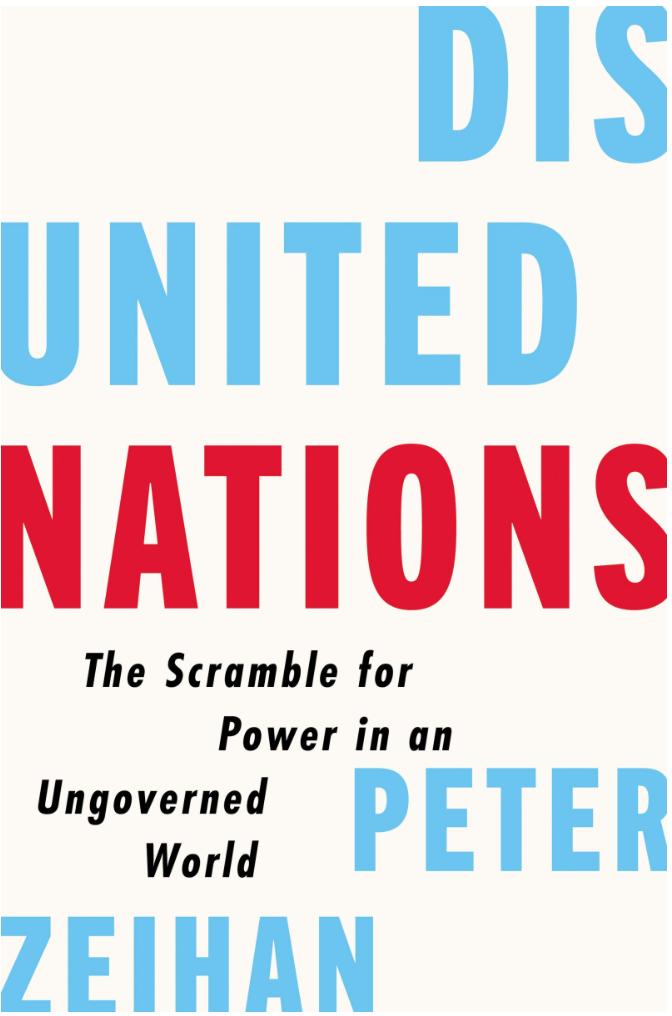[Peter Zeihan, Desunited Nations. The Scramble for Power in an Ungoverned World (New York: Harper Collins, 2020) 453 pgs]
October 14, 2020
review / Emili J. Blasco
 The world seems to be heading towards what Peter Zeihan calls "the great disorder". His is not a catastrophist vision of the international order for the mere pleasure of wallowing in pessimism, but rather a fully reasoned one. The retreat of the United States is leaving the globe without the ubiquitous presence of the one who ensured the global structure we have known since World War II, forcing other countries into more insecure intercontinental trade and to make a living in an environment of "disunited nations".
The world seems to be heading towards what Peter Zeihan calls "the great disorder". His is not a catastrophist vision of the international order for the mere pleasure of wallowing in pessimism, but rather a fully reasoned one. The retreat of the United States is leaving the globe without the ubiquitous presence of the one who ensured the global structure we have known since World War II, forcing other countries into more insecure intercontinental trade and to make a living in an environment of "disunited nations".
Zeihan has long been drawing consequences from his seminal idea, set out in his first book, The Accidental Superpower (2014): the success of fracking has given the United States energy independence, so it no longer needs Middle Eastern oil and will progressively withdraw from much of the world. In his next book, The Absent Superpower (2016), he detailed how American withdrawal will leave other countries unable to secure important maritime trade routes and reduce the proliferation of developed contacts in this era of globalization. The latter has now been accelerated by the Covid pandemic, which came as a third Issue, Desunited Nations (2020), was about to be published. Zeihan did not have time to include a reference letter to the ravages of the virus, but there was no need because his text was in any case heading in the same direction.
Zeihan, a geopolitical analyst who worked with George Friedman at Stratfor and now has his own signature, studies this time how the different powers will adapt to the "great disorder" and which of them have better prospects. The book is "about what happens when the global order is not only crumbling, but when many leaders feel that their countries will be better off tearing it down. And it's not just a Trump Administration thing: "The push for American retreat didn't start with Trump, nor will it end with him," Zeihan says.
The author believes that, in the new outline, the United States will remain a superpower, China will not reach a hegemonic position and Russia will continue its decline. Among other minor powers, France will lead the new Europe (not Germany; while the British "are doomed to a multi-year depression"), Saudi Arabia will give more concern to the world than Iran and Argentina will have a better future than Brazil.
To focus on the US-China rivalry, it would be good to pick up some of the arguments put forward by Zeihan for his skepticism about the consolidation of the Chinese boom.
To be an effective superpower, China needs greater control of the seas. The problem is not to build a large outward-oriented navy, but, since it is already difficult to sustain such a huge effort over time, it must also have simultaneously "a huge defensive navy and a huge air force and a huge internal security force and a huge army and a huge intelligence system and a huge special forces system and a global deployment capability".
For Zeihan, the question is not whether China will be the next hegemon, which "it cannot be", but "whether China can even hold together as a country". Vectors that work against it are the impossibility of feeding its entire population on its own, the lack of sufficient energy sources of its own, the strong territorial imbalances or demographic constraints, such as the fact that there are 41 million Chinese men under 40 years of age who will never be able to get married.
It is not uncommon for American authors to predict a future collapse of China. However, episodes such as the coronavirus, initially seen as a serious stumbling block for Beijing, never end up cutting short the forward march of the Asian colossus, even though, logically, China's economic growth figures have been moderating over the years. Hence, at times, the bad omens of many could be interpreted more as wishful thinking than as an analysis with sufficient doses of realism. Zeihan certainly writes in a somewhat "loose" way, with blunt statements that seek to shake the reader, but his geopolitical axioms seem to be generally endorsed: if we liquefy well what he says in his three books, we have a clear notice where the world is supposed to be going; and that is where it is indeed going.